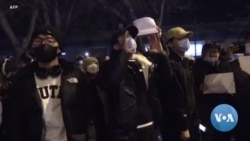The White House Monday expressed support for peaceful protests popping up around China — but administration officials did not say whether Beijing should change the strict “zero-COVID” policies that drove the weekend demonstrations.
More than a dozen street protests have shaken several Chinese cities in recent days, after a deadly fire killed 10 people in a locked-down apartment complex in northwestern China's Xinjiang region, home of the Muslim Uyghur people. That fire sparked widespread anger over the nation's strict COVID controls, which led to protests in the capital, Beijing; in the economic hub of Shanghai; in the eastern city of Hangzhou, in the southern cities of Guangzhou, Wuhan and Chengdu, in the central cities of Lanzhou and Nanjing and in the far western city of Korla.
But at the White House, the reaction has been measured.
"Our message to peaceful protesters around the world is the same and consistent: people should be allowed the right to assemble and to peacefully protest policies or laws or dictates that they take issue with," said John Kirby, coordinator for strategic communications at the National Security Council.
But, Kirby added, the administration was careful in discussing Beijing’s strict management of the pandemic, which has led to school and business closures and kept tens of millions of people house-bound.
"Lockdown is not a policy that we support here," he said. "Obviously, there are people in China that have concerns about that and they're protesting that and we believe they should be able to do that peacefully."
On Capitol Hill, U.S. lawmakers are more blunt, highlighting protesters' complaints about Chinese government censorship, symbolized by pieces of blank white paper.
"We're seeing the Chinese people stand up against the Draconian approach of the Communist Party of China, and concerned not only about COVID policies, but also about censorship," Sen. Mark Warner, a Democrat from Virginia, told VOA. "As I've said, my beef is not with the Chinese people, I think the Chinese people are expressing their desire to have more freedom and less censorship in their own country, and I stand with them."
Republican lawmakers are calling for overt support by the White House for the Chinese demonstrators.
"The Biden administration's response has been worse than expected," said Sen. Ted Cruz, a Republican from Texas. "The CCP should know that one way or another, in the coming months or in the coming years, the United States will hold accountable each and every CCP official responsible for atrocities against these protesters."
A State Department spokesperson told VOA that diplomatic efforts would focus on fighting the pandemic.
"We've said that [China's] 'zero COVID' is not a policy we are pursuing here in the United States," said the official, who spoke on the condition of anonymity as they were not authorized to be named. "And as we've said, we think it's going to be very difficult for the People's Republic of China to be able to contain this virus through their 'zero COVID' strategy.
"For us, we are focused on what works and that means using the public health tools like: continuing to enhance vaccination rates and making testing and treatment easily accessible," the spokesperson said. "We've long said everyone has the right to peacefully protest, here in the United States and around the world. This includes in the PRC."
The U.S. has not offered any of its vaccines to China, Kirby said.
"We have not received any requests or any interest by China to receive our vaccines," he said Monday.
China's government has pushed back against the charge that the apartment fire, which happened in the northwestern Xinjiang region, is related to their pandemic policies.
"It's true that on social media there are forces with ulterior motives that relate this fire with the local response to COVID-19," said Zhao Lijian, Chinese Foreign Ministry spokesperson.
He did not say when the government's policy would end.
Those watching closely say one thing is clear: these protests are extraordinary.
"That is a type of thing that gets people thrown in jail," said Julian Ku, a professor of law at Hofstra University in New York. He spoke to VOA via Zoom.
"So it is a real shock that people are willing to say that in public, out loud and be recorded and try to also mobilize other people to support that. I mean, it's a sign of just how frustrated people are now," Ku said. "I wouldn't say that this is, you know, a movement or anything like that. But it does signify that this is different than, again, normal protests in China, which are usually much more localized."
It's also clear that the strict policies, which are intended to stop the spread of the virus, are not stopping the spread of discontent in other cities around the world. On Monday, members of the Uyghur community protested outside the State Department in Washington.
Natalie Liu contributed to this report.









